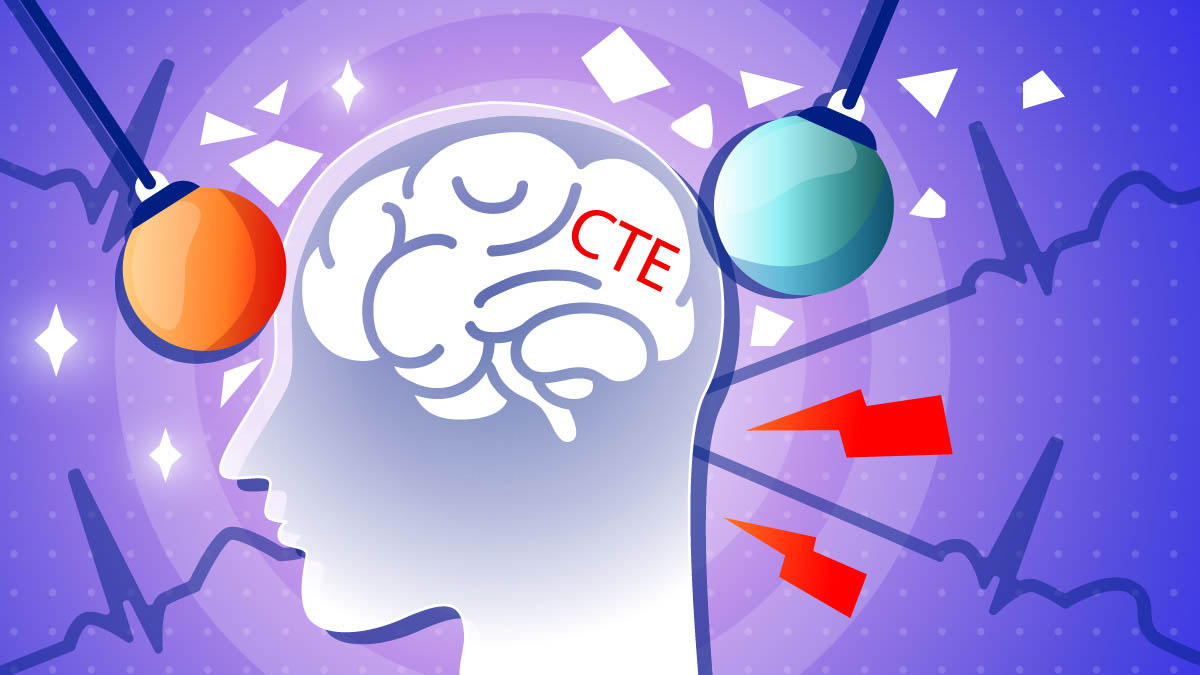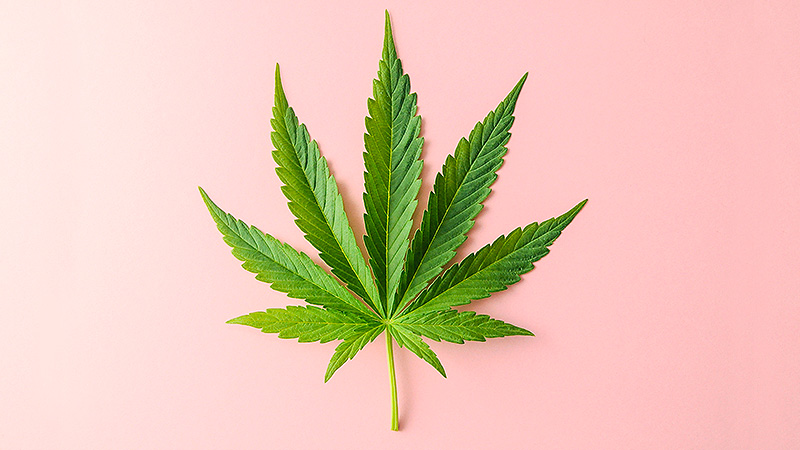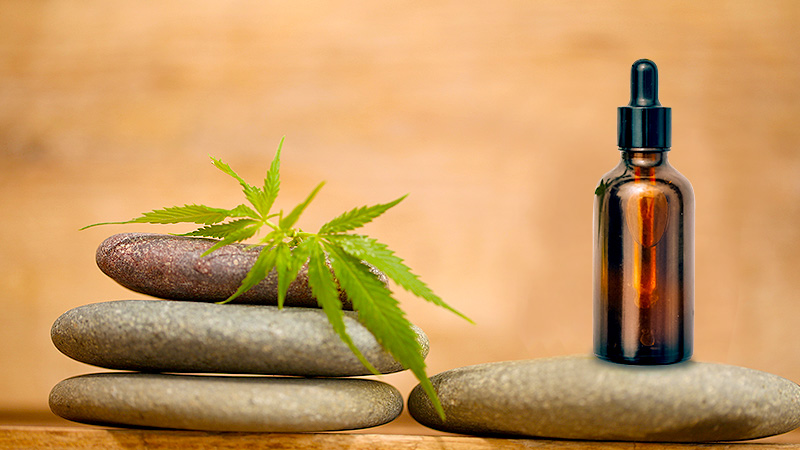CBD for CTE: Does It Help?

Degenerative brain diseases such as chronic traumatic encephalopathy can be resistant to conventional treatments. CBD, however, may be able to overcome this barrier.
In this article, I’ll break down the odds behind the treatment of chronic traumatic encephalopathy and shed light on CBD’s potential in this area.
I’ll also help you understand the principles of doing research on CBD companies so that you always make a well-informed decision.
Now to the main part.
What is Chronic Traumatic Encephalopathy (CTE)?
Chronic traumatic encephalopathy (CTE) is a degenerative disease of the brain that most likely results from repeated head trauma over the course of years.
It’s a rare condition, most commonly found among professional sportspeople who engage in contact sports, such as football, but it can also happen to military veterans.
How Is CTE Diagnosed?
As of now, CTE can only be diagnosed after death with an examination of brain tissue. However, it can be preceded by symptoms that some people with CTE report, including:
- Aggression
- Depression and anxiety
- Issues with impulse control
- Mood swings
- Paranoia
Other progressive cognitive symptoms associated with CTE are as follows:
- Dementia
- Impaired judgment and confusion
- Short-term memory loss
As of this writing, CTE has no official cure. That being said, some professional athletes have come forth with the idea that CBD – short for cannabidiol, a major cannabinoid from hemp – may be a viable solution for managing the symptoms, and thus signal a future diagnosis for the disease.
Below I share my findings on the potential benefits of CBD for chronic traumatic encephalopathy, including scientific research and a user’s guide to maximize the benefits of your supplementation.
What is CBD?

As I mentioned above, CBD is an active ingredient found mostly in hemp, but it also occurs in high-CBD marijuana strains from the selective breed. Despite being a close cousin of THC, it has completely different effects on the mind and body.
Most importantly, CBD won’t get you high, so it’s safe to consume by most people. At the same time, CBD may offer a broad range of therapeutic benefits for many health conditions, from anxiety and depression to seizures, autoimmune conditions, and neurological disorders.
CBD appears in three main forms:
- Full-spectrum. This type of CBD covers the entire range of phytochemicals from the plant, including minor cannabinoids, terpenes, flavonoids, and up to 0.3% THC in federally legal CBD supplements.
- Broad-spectrum. This one is pretty much the same as full-spectrum, except for THC, which is removed further during filtration.
- Isolate. This is pure CBD. It boasts the highest concentration of CBD per milligram, but it doesn’t have synergistic compounds like terpenes, flavonoids, and minor cannabinoids.
Full-spectrum products are thought to be the most beneficial because they evoke the entourage effect. In this biological phenomenon, the aforementioned compounds work together in synergy to enhance their beneficial properties while mitigating the potential unwanted effects.
For example, CBD can counteract the psychedelic potential of THC, while THC may improve the anti-inflammatory and analgesic properties of CBD.
CBD products are available as:
- Oils and tinctures
- Gummies
- Capsules
- Vapes
- Topicals
- Beauty products
Can CBD Help with Treating Chronic Traumatic Encephalopathy?
There’s not much research on the efficacy of CBD in treating CTE, to be honest.
In a 2018 review of studies, the authors acknowledged the anecdotal efficacy of cannabis in treating the following CTE symptoms:
- Agitation
- Dizziness
- Headache
- Insomnia
- Nausea
- Psychosis
The review team also noted that more research is needed to conclude on this subject. Moreover, the review included the effects of both THC and CBD, not either of them alone.
A 2017 review also found that cannabinoids were effective in the treatment of traumatic brain injuries in general, with more clinical studies needed to fully understand their place.
Other studies point to CBD as a potential physiological, biochemical, and psychological aid for athletes, although this isn’t specifically related to the symptoms of CTE.
Scientists also underline that this evidence comes mostly from preliminary and animal-based studies, with more human research required.
More Evidence Supporting the Use of CBD for CTE
CTE is caused by the buildup of protein, known as tau, throughout the brain-destroying neurons along the way.
The major indicators of CTE are memory loss, confusion, poor judgment, and progressive dementia. The cognitive symptoms are usually preceded by the physical ones.
Researchers believe that neuroinflammation — an inflammation response within the brain — plays a critical role in the development of CTE.
In particular, microglial cells of the nervous system used to defend the immune system are linked to the accumulation and spread of the said protein.
Upon activation, these cells trigger a neuroinflammatory response that scientists believe can be used for therapeutic interventions.
CBD has been highlighted several times in the scientific literature as a potential anti-inflammatory and neuroprotective drug.
A 2017 review that evaluated several studies on CBD’s effects in animals with Alzheimer’s disease revealed that CBD reduced neuroinflammatory response and cell damage while promoting the formation of new nerve cells — a process called neurogenesis.
In addition, the review mentioned cannabidiol for its ability to reverse and prevent the development of cognitive impairment in rodents. Cognitive deficits are one of the main symptoms of chronic traumatic encephalopathy.
Related: Does CBD Affect Memory
How CBD Works to Help with CTE Treatment

The animal-based studies and preliminary human research has given us some insight into CBD’s mechanisms of action when it comes to neurodegenerative disorders.
The vast majority of CBD’s therapeutic effects come from its interaction with the endocannabinoid system (ECS).
The ECS is the major regulatory system in mammals that is said to promote and maintain homeostasis (balance) throughout the body. It’s composed of cannabinoid receptors (CB1 and CB2), endocannabinoids (neurotransmitters), and enzymes that metabolize endocannabinoids once they’ve been used.
CBD indirectly modulates the activity of the CB1 receptor of the ECS. Several studies have shown that this type of receptor has neuroprotective properties and can be used to prevent neuronal damage.
One study analyzed the neuroprotective effects of CBD and found that the cannabinoid was a remarkable neuroprotectant thanks to its anti-inflammatory CB1 receptor interaction.
Even better, a 2010 study discovered that CBD induced significant neuroprotection in the brain of newborn mice by engaging with another type of ECS receptor known as CB2.
When activated, these receptors may delay the progression of neurodegenerative incidents, especially those that involve microglial cells.
Is CBD Safe to Use if You Have CTE?
CBD has a decent safety profile, both in animals and humans. People can tolerate doses as high as 1,500 mg for several weeks without any serious side effects.
Numerous global health agencies, including the World Health Organization, have deemed cannabidiol a safe and well-tolerated substance.
That said, taking too much CBD at a time may cause a few mild side effects, such as:
- Dry mouth
- Appetite fluctuation
- Fatigue
- Dizziness
CBD also interacts with a lot of pharmaceutical medications. Depending on the type of interaction, it can speed up or slow down the metabolism of the other drug, so if you take any medications and want to add CBD to your daily routine, it’s best to consult a doctor first.
How to Choose the Best CBD Oil for Brain Damage
CBD oil is beneficial for the brain’s functions but you must choose the right CBD oil to ensure that you will reap the benefits of CBD.
You can say a lot of things about the CBD space, but one is 100% sure — there’s no standardization among products.
No two CBD oils are the same. You can get a high-quality product from organic hemp for the same price as a cheap snake oil marketed as a miracle cure for all health issues.
It’s not easy to find a good CBD product in today’s market.
But, I will make it easier for you.
Follow these steps and you’ll quickly be able to separate the wheat from the chaff.
Read the COA
The Certificate of Analysis (COA) is proof that a CBD product has passed a laboratory test in a third-party facility for purity and safety.
COAs should be readily available on a company website or via mail or QR code on the product packaging.
Keep in mind that it’s not enough if a company simply displays its COAs. Make sure they’re up-to-date and comprehensive.
In other words, the COA should list:
- The date of screening
- How much CBD, THC, and other cannabinoids are in the product
- Which terpenes does the product contain
- Whether the product was free from mold, pesticides, solvents, and heavy metals.
Search for Lawsuits and FDA Warning Letters
The FDA sends out warning letters to CBD brands that violate the agency’s rules regarding the marketing of CBD products.
You can easily look up the company’s history with the FDA, and whether it’s been involved in any lawsuits. This can give you a bigger picture of the company’s transparency and reputation.
Read Customer Reviews
A quick online check on independent websites like blogs, online rankings, Reddit threads, or Quora, should spit out plenty of results if the company makes good products and has caring customer service.
If it’s the other way around, or the company has no presence at all, it’s a big red flag.
Look Up the Hemp Source and Extraction Method
Hemp plants have bioaccumulative properties, so if they grow in healthy soil, they will yield healthy plants rich in CBD and other phytochemicals. But, if they are cultivated in poor-quality soil and contaminated with pesticides, they will transfer these toxins into the end product if not purified at high temperatures — which compromises the potency and phytochemical profile of the product.
The best CBD oils for CTE come from organic hemp grown here in the USA. That’s because US farmers are subject to strict quality control procedures laid out by the USDA.
As for the extraction method, CO2 technology is the golden standard — and for a good reason.
CO2 is used in its supercritical state — where it acts as a gas and liquid at the same time — effectively stripping the beneficial compounds from the source material without using extra heat or dangerous solvents.
This way, the manufacturer can maintain consistent potency and purity throughout batches.
Recommended CBD Dosage for CTE

There are no official dosage charts for CBD in specific health conditions. This is also true for chronic traumatic encephalopathy.
Although the FDA recognizes cannabidiol’s therapeutic versatility, it hasn’t yet investigated the supposed medical applications for CBD other than epilepsy and multiple sclerosis.
However, you can look into past studies on the use of CBD for CTE and find a dosage that you’ll use as your starting point. From there, you can either decrease or increase the dose depending on your body’s response to CBD.
For example, a 2019 study found that CBD’s effective dosage may range between 1 and 50 mg/kg per day. The authors also acknowledged that the side effects of CBD are usually mild and rare.
Methods of Taking CBD for CTE
As mentioned at the beginning of this article, there are many ways to take CBD for chronic traumatic encephalopathy, including CBD oil, edibles, topicals, capsules, and even vape products.
CBD oil contains a hemp extract (full-spectrum, broad-spectrum, or isolate) suspended in a carrier oil for better absorption. You take it under the tongue and hold it there for up to 60 seconds, then swallow. The dose is measured out with a special dropper.
Edibles, such as gummies or honey sticks, are a more direct method of supplementing CBD. You can also try CBD capsules if you already take a few supplement pills in the morning. Oral forms of CBD have a slower onset (40–120 minutes) but last longer than oils and vapes.
Speaking of CBD vapes, they offer the highest bioavailability and the fastest acting time of all product types. However, they have the shortest duration, so they work better “on demand.”
Applying topicals by way of balms, gels, creams, and salves is ideal for addressing localized problems, such as muscle tension, soreness, inflammation, bruises, and swelling.
CBD vs Other Natural Treatments for CTE
Vitamins and minerals, such as D, E, and zinc, can be a good addition to your supplementation plan if you’ve just suffered from a traumatic brain injury.
One clinical trial found that a combination therapy featuring vitamin D and progesterone was able to curb neuroinflammation in animals.
Animals that received vitamin E demonstrated a significant alleviation or reduction of learning deficits.
Vitamin E is a potent antioxidant due to its ability to protect cells against oxidative damage.
Oxidative damage is a major contributor to neurodegeneration.
A study examining the effects of zinc supplementation also pointed to the mineral as a potentially effective treatment for dealing with cognitive impairment and depression, following a traumatic brain injury.
Similar to the above supplements, CBD has beneficial neuroprotective properties; plus, many companies are now making CBD products infused with vitamins D, E, and zinc.
Final Thoughts: Can CBD Help with Chronic Traumatic Encephalopathy?
Chronic traumatic encephalopathy is a neurodegenerative condition triggered by repetitive damage to the head. It’s more common in athletes and individuals who engage in extreme sports, exposing themselves to brain traumas.
CTE is probably caused by neuroinflammation, which is an inflammatory response of the brain. CBD may counteract this inflammation and protect neurons against further damage. On top of that, CBD takes part in neurogenesis — the formation of new nerve cells.
Although there aren’t many direct studies when it comes to treating CTE with CBD, the current body of evidence is very promising. I’m excited about clinical trials in this regard in the future — they will surely come, it’s just a matter of time.
Did you notice the positive effects of CBD on your cognition? Share your stories in the comments below.